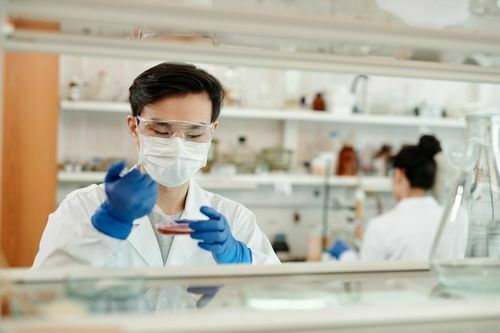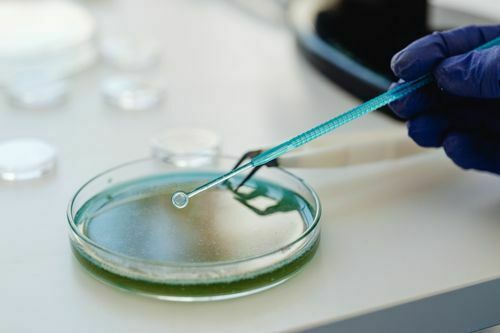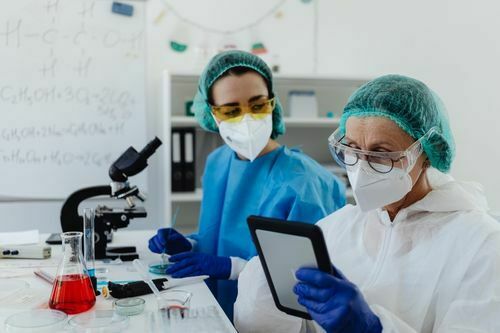Table of Contents
- What is microbiology?
- Importance of microbiologists
- What is the work of a microbiologist?
- Types of microbiologists
- Educational qualification for a microbiologist
- Top 10 colleges to study microbiology in the world
- Career opportunities for microbiologists
- Microbiologist’s salary
- Future of microbiologists
- Key takeaways
- FAQs
What is microbiology?
Microbiology is a daily part and parcel of our life. From making yogurt to cheese, microorganisms are required. Their influence on food production, biotechnology, and genetic engineering is also duly noted. Microbiology has seen an undeniable increase in work opportunities since the pandemic. As a matter of fact, the jobs for microbiologists are on the rise. Read this blog to know all about becoming a microbiologist.
Importance of microbiologists
The COVID-19 pandemic has highlighted the importance of microbial sciences to the entire world and proved its assistance in the prevention and management of a wide range of diseases. Microbiology has also seen a surge in employment opportunities. The responsibilities of microbiologists include engagement and assistance in a wide range of laboratory tests. These tests are conducted on specimens collected from plants, humans, and animals to aid in the detection of disease.
What is the work of a microbiologist?

Microbiologists have designated day-to-day activities, such as –
- They are required to conduct daily experiments on microorganisms in various environments.
- Microbiologists, additionally, need to keep developing and testing multiple samples for medicinal purposes.
- Microbiologists manage laboratory work and draft daily reports from tests conducted.
The work of a microbiologist is very delicate and requires years of training. They need a strong base of analytical techniques and knowledge about specialist computer software. Microbiologists are well versed in working in a team to carry out tasks meticulously. Research plays an essential role in the work that needs to be done by a microbiologist.
Types of microbiologists
Environmental microbiologists are the professionals that identify organisms and research their uses, like cleaning up oil spills and hazardous wastes. They also develop genetic probes to identify microbial contaminants in the water supply.
1. Agricultural microbiologists
They primarily work on developing disease-resistant crops and producing vaccines to protect livestock from diseases.
Agricultural microbiologists specialize in finding naturally-occurring organisms that can replace the use of traditional chemical pesticides that can affect the quality of crops.
It also deals with plant-related microbes and plant & animal diseases. These microbiologists play a crucial role in ensuring the health of our livestock and plants does not compromise, and the quality is consistent.
2. Medical microbiologists/virologists
Medical microbiologists or virologists must identify and study the microorganisms that cause dreadful diseases such as Lyme disease, AIDS, and toxic shock syndrome.
We live in a world where diseases can take over the human race; hence we are working towards finding solutions with the help of microbiologists.
Medical virologists focus on viral infections. They will usually work with clinical colleagues, GPs, and laboratory staff rather than patients. You’ll be hands-on and expected to do the following:
- Antigen detection methods
- Techniques for high-throughput nucleic acid extraction
You can identify your subject of interest in microbiology and specialize in it. By doing so, you will be contributing to a better quality of life on the planet.
3. Immunologists
Lastly, there are immunologists. They contribute to developing immune responses and creating vaccines, which greatly establish herd immunity.
Educational qualification for a microbiologist

A career in microbiology requires a solid educational base. Students need at least a bachelor’s degree and basic knowledge in subjects like maths, biology, chemistry, and English.
The following degrees are an excellent stepping stone for a career in the industry-
1. Bachelor of Science in Microbiology
A Bachelor of Science (BSc) in Microbiology is a four-year program with coursework that familiarises the student with the fundamentals of the subject and basic laboratory skills. The successful completion of this program opens up a range of career options, such as forensic laboratory technician or product developer.
2. Master of Science in Microbiology
A Master of Science (MS) in Microbiology typically takes 1-2 years to complete. The coursework is more complex than the undergraduate degree and focuses on topics like cytokinesis and microbial pathogenesis. Graduates have lucrative career options in governmental, industrial, and clinical sectors.
3. Ph.D. in Microbiology
A doctorate in microbiology takes approximately 4-5 years. The degree coursework focuses more on research and includes advanced microbiology, virology, and immunology topics. Graduates can look forward to careers as educators, microbiology scientists, or independent researchers.
Top 10 colleges to study microbiology in the world

- Harvard University, Cambridge (US)
- Massachusetts Institute of Technology, Cambridge (US)
- The University of California– San Diego, La Jolla (US)
- University of Oxford, United Kingdom
- The University of California-San Francisco, San Francisco (US)
- The University of Washington, Seattle (US)
- Cornell University, Ithaca (US)
- University of Pennsylvania, Philadelphia, (US)
- Washington University in St. Louis, St Louis (US)
- The University of California-Berkeley, Berkeley (US)
Career opportunities for microbiologists
- Clinical microbiologist or immunologist
- Food or dairy microbiologist
- Public health microbiologist
- Environmental microbiologist
- Recombinant DNA technologist
- Research laboratory technician
- Quality control analyst
- Fermentation technologist
- Research scientist
- College teacher
- Doctor of Veterinary Medicine
- Doctor of pharmacy
Microbiologist’s salary
A microbiologist’s salary abroad ranges from $42 500 to $73 500, with an average annual salary of $31,000. The salary depends on the level of experience and years of practicing as a microbiologist.
Future of microbiologists
As a profession, microbiology is expected to grow at a rate of 5% between 2018 and 2028. The scope of microbiology is significant because of its continual involvement in various sectors like pharmacy, medicine, clinical research, agriculture, the dairy industry, the water industry, nanotechnology, chemical technology, and more!
Key takeaways
- COVID-19 led to high demand for microbiologists with a good pay scale across the globe
- The economic and employment rate in the field of microbiology is expected to increase by 5% in the coming years.
- Having the relevant postgraduate qualifications in microbiology will provide you with better job prospects.
We hope you found this blog informative and engaging. If so, please share your thoughts in the comments below.
Click here to reach out to us for more information. We would be happy to assist you with your queries!
Liked this blog? Then read Cosmetology | Everything you must know about this course!
FAQs
Q1. What is the highest-paying job in microbiology?
Answer: In microbiology, the highest-paying job opportunity is that of a medical scientist. Medical scientists typically earn an annual salary of approximately USD 95,310.
Q2. Which country is the best for job opportunities in the microbiology industry?
Answer: England is said to have a wide range of lucrative and well-paying job opportunities in the global microbiology industry.
Q3. Are microbiologists in demand in India?
Answer: Yes, India is a country that continues to see a significant demand for professional microbiologists post the COVID-19 pandemic.






